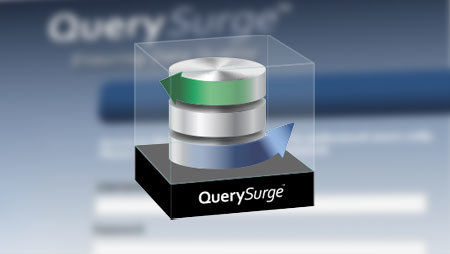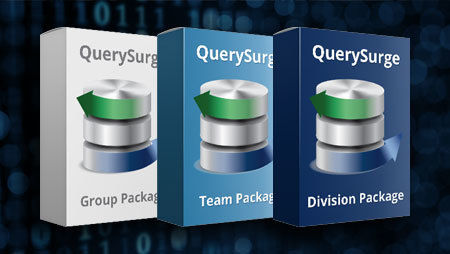White Paper
Why investing in QuerySurge is the right choice
for data testing when security is critical.

It’s not worth the risk.
Why investing in QuerySurge is the right choice for data testing when security is critical.
Introduction
Your organization is at a point where testing your data manually is no longer a viable option. The volume and variation of data requires the implementation of an automated solution. While open-source tools, such as Python scripts, may be an enticing option with their flexibility and no-cost price tag for the software, they also pose security risks that enterprises must consider. Conversely, a commercial solution provides the necessary enhanced security features that mitigate these risks. This whitepaper explores the security risks of using open-source or home-grown frameworks for data testing, supported by real-world examples, and highlights the security advantages of a commercial solution, such as QuerySurge.
Security Challenges of Open-Source or Home-Grown Data Testing Frameworks
- Vulnerabilities in Open-Source Libraries
- Open-source frameworks like Python rely on a vast ecosystem of libraries, many of which may contain security vulnerabilities. Attackers can exploit these vulnerabilities if dependencies are not regularly updated, leading to potential data breaches or compromised systems. Additionally, organizations may inadvertently use outdated or unmaintained libraries, further increasing security risks.
For example, between December 30, 2024, and March 4, 2025, the Python JSON Logger library was vulnerable to remote code execution (RCE) due to a missing dependency. The issue arose when the msgspec-python313-pre package was deleted by its owner, leaving the name available for potential takeover. If a malicious actor claimed this package, they could execute arbitrary code on any system that installed the development dependencies on Python 3.13.
- Open-source frameworks like Python rely on a vast ecosystem of libraries, many of which may contain security vulnerabilities. Attackers can exploit these vulnerabilities if dependencies are not regularly updated, leading to potential data breaches or compromised systems. Additionally, organizations may inadvertently use outdated or unmaintained libraries, further increasing security risks.
- Lack of Enterprise-Grade Security Controls
- Python-based testing frameworks often lack built-in security features like authentication, role-based access control (RBAC), and encryption. Without a full-featured solution, organizations must implement these controls manually, increasing the risk of misconfigurations and security gaps. In an enterprise setting, failing to properly enforce access control mechanisms could lead to unauthorized users accessing or modifying critical test data, resulting in data corruption or exposure of sensitive information.
- Data Exposure Risks
- When storing and transmitting sensitive test data, this data may be exposed to unauthorized users due to improper access controls, unencrypted data transfers, or insecure data storage practices. Unlike commercial solutions that provide support for encryption and secure data storage, open-source tools are often implemented with little to no security around data handling. When sensitive information, such as personally identifiable information (PII) or financial data, is not properly secured, it could lead to compliance violations and data breaches.
- Unverified Code Contributions
- Open-source libraries are maintained by a global community that could allow for malicious or poorly vetted code to be introduced into widely used libraries. Attackers have been known to introduce backdoors into open-source packages, which can be inadvertently included in enterprise environments if proper scrutiny is not applied. In March 2025, twenty distinct malicious packages were discovered on the Python Package Index (PyPI). These packages were designed to steal sensitive data, including cloud access tokens from popular cloud service providers.
- Compliance Challenges
- Many industries require strict compliance with regulations such as GDPR and HIPAA. Python frameworks often lack built-in compliance support, making it difficult for enterprises to meet regulatory requirements without extensive customization. Ensuring compliance with data protection laws requires logging, auditing, and reporting capabilities, which many open-source solutions do not provide by default. Organizations relying on open-source tools must build these features from scratch, adding complexity and increasing the likelihood of compliance failures.
- Risk of Dependency on Unverified Third-Party Plugins
- Many open-source frameworks require third-party plugins or extensions to expand their capabilities. However, these plugins may not always be rigorously tested for security vulnerabilities. Using unverified third-party extensions increases the risk of introducing security flaws into the testing framework, further exposing sensitive data to potential breaches. Python packages can be vulnerable to code injections, allowing hackers to hijack them and gain unrestricted access to systems or datasets.
- Hidden Costs of Developing Security Features
- While open-source tools may appear cost-effective at first glance, the resources required to build and maintain adequate security features can be significant. Organizations often need to allocate time and expertise to develop features such as secure authentication, encrypted data handling, auditing, and role-based access. These tasks demand specialized skills and ongoing maintenance, which can offset any initial cost savings. Moreover, internal development of security features increases the risk of introducing bugs or gaps that could compromise data security.
Security Benefits of Utilizing a Commercial Solution, such as QuerySurge
- Enhanced Authentication and Access Controls
- QuerySurge provides a full range of built-in features and industry-standard authentication mechanisms to keep your data secure. QuerySurge’s Projects feature enables you to assign user access to specific projects, allowing only authorized users to view connection information and test results within that project. In addition, QuerySurge supports enterprise level authentication controls, such as Ligh-Weight Authentication Protocol (LDAP/S), and Single Sign-On (SSO). QuerySurge natively supports most of the major SSO providers (Google, Microsoft, Okta, and Ping Identity). This ensures that only authorized users can access and modify testing data. Additionally, QuerySurge offers full inventorying and management of testing assets (an often-overlooked aspect of security.)
- Encrypted Data Handling
- QuerySurge offers encryption for password data at rest and all data transit, significantly reducing the risk of data leaks and unauthorized access. QuerySurge communication can be configured with the latest HTTPS/SSL protocol to protect all data in transit.
- Frequent Security Updates and Patch Management
- The QuerySurge security team continually monitors vulnerabilities and regularly introduces patches i into their standard release schedule. This process keeps the testing environment up-to-date and secure against hostile actors. These updates are made available for all active subscriptions and customers with active maintenance contracts.
- Compliance, Audit Readiness, and Data Management Controls
- QuerySurge is designed with compliance in mind, offering built-in logging, audit trails, and reporting tools that help organizations meet industry regulations effortlessly. All test results are stored indefinitely by default and are easily accessible if needed for auditing. When auditing is not required and purging tested data is crucial to compliance, QuerySurge has many different data management options, that can be tailored to an organization’s security preferences. Results can even be moved off-server and moved to a secure cold storage location. These results can be inflated into QuerySurge if required for an audit.
- Enterprise-Grade Support and Reliability
- With a commercial solution, organizations benefit from dedicated security support, reducing the burden on internal teams and ensuring rapid response to security threats.
Conclusion
While open-source frameworks, like Python, or home-grown frameworks offer flexibility, they introduce significant security risks that can be challenging to manage. Real-world incidents, and the insertion of malicious packages into open-source libraries, highlight these vulnerabilities. Commercial solutions like QuerySurge provide robust security features, automated compliance support, and enterprise-grade protections that mitigate these risks. Organizations handling sensitive data should consider the security advantages of commercial data testing solutions to protect their data and maintain compliance effectively.
About RTTS & QuerySurge:
RTTS is an innovative pure-play QA & testing organization specializing in test automation. With headquarters in New York City and customers throughout North America, RTTS has served Fortune 500 and mid-sized companies since 1996.
RTTS draws on its expertise by utilizing proven processes, expert test engineers, and best-of-breed software solutions to assure your application functionality, reliability, scalability, security, and data quality.

QuerySurge is RTTS’ smart data testing solution that automates the data validation and ETL testing of Big Data, Data Warehouses, Business Intelligence Reports and Enterprise Applications with full DevOps/DataOps functionality for continuous testing.




